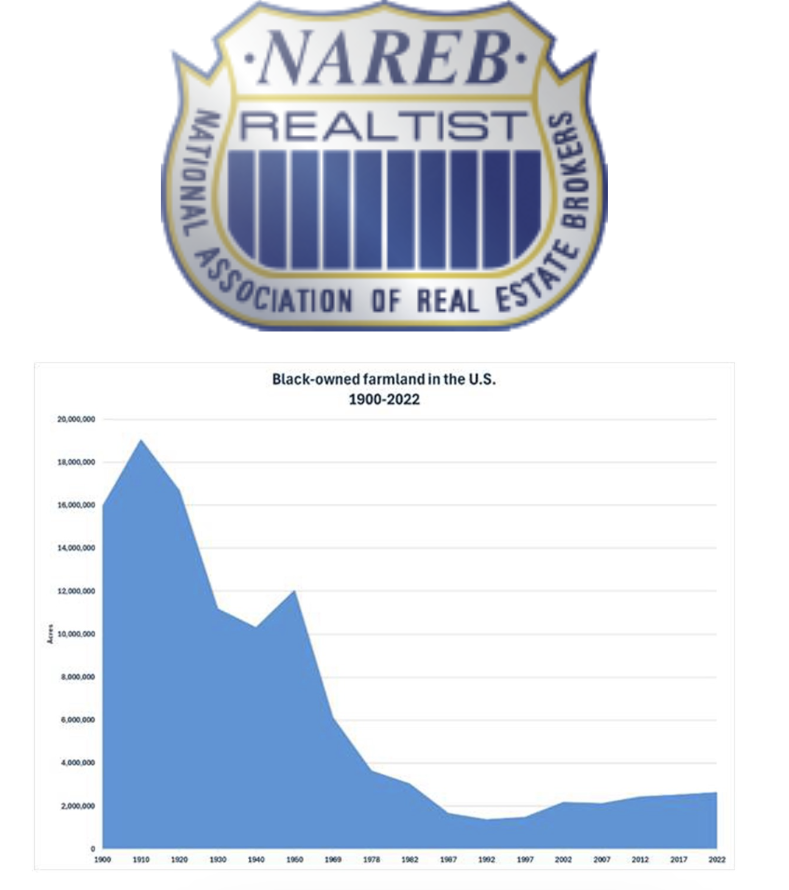1/14/2025

Imagine owning a treasure passed down through generations, only to watch it slip away through cracks in the legal system. For countless Black families across the United States, this isn't a hypothetical scenario but a harsh reality rooted in heirs' property laws. The National Association of Real Estate Brokers (NAREB) is shining a spotlight on this issue with its groundbreaking study, “Heirs’ Property in the United States - Its Destabilizing Structure and Contribution to Black Property and Wealth Erosion.”
This eye-opening report exposes the discriminatory policies and practices that have systematically stripped Black families of their land and wealth since the end of slavery. The findings are not just about history; they reveal an ongoing battle for justice, economic equity, and the right to preserve family legacies.

Heirs’ Property: A Double-Edged Sword
At first glance, heirs' property—a legal structure where land ownership is shared among descendants—might seem like a democratic solution. However, without clear titles or estate planning, these properties become vulnerable to exploitation. Outside developers, legal loopholes, and forced sales have resulted in devastating land losses. In fact, Black families have lost 90% of the land they held in 1910, often due to limited legal resources and systemic discrimination.
Dr. Courtney Johnson Rose, NAREB President, underscores the gravity of the issue:
"Public policies have historically enabled private and public entities to engage in predatory land acquisition from Black families, fueling a long legacy of land theft."
A Legacy Lost: From Farmland to Luxury Resorts
The report paints a vivid picture of loss, citing Kiawah Island, South Carolina, as a poignant example. Once a thriving community of Black landowners, the island is now known for its opulent resorts. This transformation, while emblematic of economic progress for some, tells a tale of displacement and cultural erasure for the original Black owners.
The loss isn’t confined to history. Today, Black-owned farmland—once a cornerstone of economic stability and community identity—is dwindling. Properties that could have empowered families for generations are now absorbed into massive estates, often attracting Wall Street investors.
A Wealth Gap Deepened
The erosion of Black property ownership is a major contributor to the racial wealth gap. The NAREB study highlights that heirs' property issues join redlining, discriminatory housing policies, and other federal missteps in draining billions of dollars from Black communities. The impact ripples beyond individual families, stifling economic mobility and destabilizing entire communities.
"The economic and cultural significance of agricultural land goes beyond monetary value," says Dr. Rose. "It represents a path to generational wealth, a legacy of resilience, and a vital part of our shared history."
A Path Forward: Advocacy, Education, and Action
NAREB isn’t just diagnosing the problem—it’s leading the charge for solutions. The organization supports legislative reforms such as the Uniform Partition of Heirs Property Act and The Good DEED Act, which aim to protect family wealth and secure land ownership. Partnering with the National Bar Association, NAREB has launched initiatives like the “What to Do with Big Mama’s House” course, educating families about their rights and offering legal resources.
NAREB’s Black Wealth Tour brings these efforts directly to communities, blending policy advocacy with grassroots action. Dr. Rose emphasizes the importance of collective action:
"Protecting our remaining land is not just about economics; it’s about honoring the sacrifices of our ancestors and empowering future generations."
A Call to Action
As the fight for equitable property rights continues, one thing is clear: the loss of Black-owned land is not just a historical tragedy but a current crisis demanding urgent attention. NAREB’s study serves as both a wake-up call and a rallying cry, urging policymakers, community leaders, and families to unite in preserving what remains and reclaiming what’s been lost.
In the words of Rep. Emanuel Cleaver II, a staunch advocate for land protection:
"Securing Black land ownership isn’t just about preserving property—it’s about safeguarding dreams, dignity, and a future where wealth isn’t a privilege, but a right."
The legacy of heirs’ property may be tangled, but with unwavering resolve, the path forward is clear. It’s time to rewrite the narrative and ensure that Black families retain their rightful stake in the American Dream.
